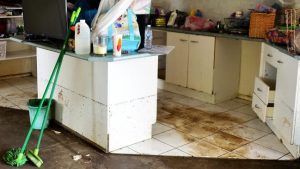 Asthma Australia is urging people with asthma in flood affected areas to take care during clean-up of mould and mildew or face a potential risk to their health.
Asthma Australia is urging people with asthma in flood affected areas to take care during clean-up of mould and mildew or face a potential risk to their health.
Warm damp environments encourage mould growth in homes which becomes airborne during the cleaning process, causing the perfect storm for people with sensitive airways.
Mould can be a major trigger for asthma – a chronic respiratory condition which impacts one in nine Australians.
Asthma Australia CEO Michele Goldman said where possible, people with asthma needed to steer clear of cleaning up mould or mildew themselves and ask someone else to do it.
“You can easily breathe in mould and fungi spores when cleaning, which can trigger asthma and allergic reactions resulting in breathing problems and other symptoms,” Ms Goldman said.
“If you can’t avoid cleaning, then you must wear good quality face mask (N95 or P2 masks) while handling mouldy things or cleaning mouldy walls.”
Cold-like symptoms such as sneezing, blocked nose, coughing and shortness of breath while in warm damp environments, can be an allergic reaction to spores of mould or other fungi.
Asthma Australia is encouraging people to be aware that their asthma may worsen over weeks or months due to mould.
“Follow your Asthma Action Plan, to be vigilant with taking their asthma medication, and to prioritise restoring a dry, safe living environment as quickly as possible.”
“Open windows and doors, air out homes and follow public health guidelines for cleaning mould,” Ms Goldman said.
People with asthma who are more likely to have asthma triggered by fungal and mould spores include:
- Babies and children
- The elderly
- Those with existing allergies and skin conditions such as eczema
- Those with a lowered immune system
- People with severe asthma
For information on how to safely clean mould and fungi from the home and how to manage asthma, please visit asthma.org.au/about-asthma/triggers/flooding-and-mould.
People who are experiencing difficulties with their asthma can call an Asthma Educator on 1800 ASTHMA (1800 278 462) for free confidential phone support and information or should visit their doctor.





 1800 278 462
1800 278 462


